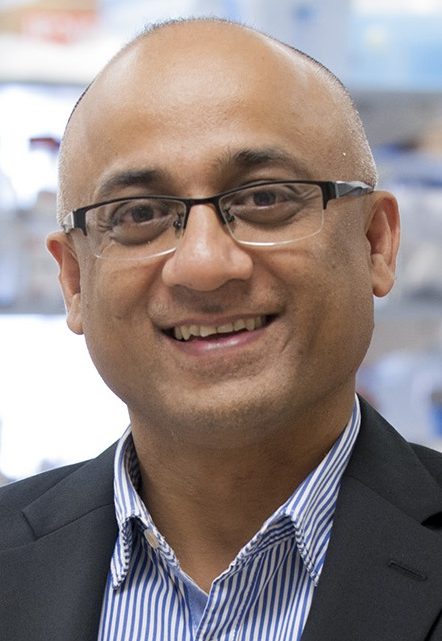Vinay Tergaonkar
Professor, Department of Pathology and the Department of Biochemistry, Yong Loo Lin School of Medicine, NUS
Affiliations
Professor, Department of Pathology and the Department of Biochemistry, Yong Loo Lin School of Medicine, NUS
Division Director, Cancer Cell Signaling, Institute of Molecular and Cell Biology, A*STAR, Singapore
Director, Mouse Models of Human Cancer, Institute of Molecular and Cell Biology, A*STAR, Singapore
Professional Experience
| Position and Institute | Year(s) |
| Professor, Department of Pathology, Yong Loo Lin School of Medicine, NUS | 2018 – Present |
| Research Director, IMCB, Singapore | 2015 – Present |
| Division Director, Cancer Cell Signaling, IMCB, Singapore | 2015 – Present |
| Director, Mouse Models of Human Cancer, IMCB, Singapore | 2012 – Present |
| Associate Professor, NUS, Senior PI, IMCB, Singapore | 2010 – 2015 |
| Assistant Professor, NUS, PI, IMCB, Singapore | 2005 – 2010 |
| LLS fellow and Special Fellow, Salk Institute, La Jolla, USA | 2000 – 2005 |
Research Interest
Cancer Cell Signalling & Biology, Genomics, Non-Coding RNAs, Novel anti-cancer strategies, Oncology drug development, Small Molecules, Peptide/siRNA therapeutics, Patient Derived xenografts, Orphan disease models.
Selected Publications
- Akıncılar SC, Wu L, Ng QF, Chua JYH, Unal B, Noda, T, Chor WHJ, Ikawa M, Tergaonkar V. NAIL: an evolutionarily conserved lncRNA essential for licensing coordinated activation of p38 and NFκB in colitis. GUT. 2020 10.1136/gutjnl-2020-322980.
- Cildir G, Toubia J, Yip KH, Zhou M, Pant H, Hissaria P, Zhang J, Hong W, Robinson N, Grimbaldeston MA, Lopez AF, Tergaonkar V. Genome-wide Analyses of Chromatin State in Human Mast Cells Reveal Molecular Drivers and Mediators of Allergic and Inflammatory Diseases. Immunity. 2019 51(5):949-965. F1000 highlight
- Akıncılar SC, Khattar E, Boon PL, Unal B, Fullwood MJ, Tergaonkar V. Long-range chromatin interactions drive mutant Tert promoter activation. Cancer Discovery. 2016 6(11):1276-1291.
- Li Y, Zhou QL, Sun W, Chandrasekharan P, Cheng HS, Ying Z, Lakshmanan M, Raju A, Tenen DG, Cheng SY, Chuang KH, Li J, Prabhakar S, Li M, Tergaonkar V. Non-canonical NFkB signaling and ETS1/2 cooperatively drive mutant TERT promoter activation. Nature Cell Biology. 2015 17(10):1327-38.
- Shin EM, Hay HS, Lee MH, Goh JN, Tan TZ, Sen YP, Lim SW, Yousef EM, Ong HT, Thike AA, Kong X, Wu Z, Mendoz E, Sun W, Salto-Tellez M, Lim CT, Lobie PE, Lim YP, Yap CT, Zeng Q, Sethi G, Lee MB, Tan P, Goh BC, Miller LD, Thiery JP, Zhu T, Gaboury L, Tan PH, Hui KM, Yip GW, Miyamoto S, Kumar AP, Tergaonkar V. DEAD-box helicase DP103 defines the metastatic potential of human breast cancers. Journal of Clinical Investigation. 2014 24(9):3807-24. Covered by local and international press.
- Ghosh A, Saginc G, Leow SC, Khattar E, Shin EM, Yan TD, Wong M, Zhang Z, Li G, Sung WK, Zhou J, Chng WJ, Li S, Liu E, Tergaonkar V. Telomerase directly regulates NFκB dependent transcription. Nature Cell Biology. 2012 14(12):1270-81. Covered by local and international press. F1000 highlight
- Wu Z, Wong ET, Shi Y, Chen Z, Miyamoto S, Tergaonkar V. ATM and NEMO-dependent ELKS ubiquitination coordinates TAk1-mediated IKK activation in response to genotoxic stress. Molecular Cell. 2010 40(1): 75-86.
- Teo H, Ghosh S, Luesch H, Wong ET, Ghosh A, Malik N, Orth A, de Jesus P, Perry AP, Oliver JD, Tran NL, Speiser LJ, Saez E, Schultz P, Chanda S, Verma IM, Tergaonkar V. Telomere independent Rap1 is an IKK-adaptor and regulates NFKB-dependent gene expression. Nature Cell Biology. 2010 (12)(8):758-67. Covered by local and international press.
- Chew J, Biswas S, Shreeram S, Humaidi M, Wong ET, Dhillion MK, Teo H, Hazra A, Fang CC, López-Collazo E, Bulavin DV, Tergaonkar V. WIP1 phosphatase is a negative regulator of NF-kappaB signalling. Nature Cell Biology. 2009 11(5):659-66. Covered by local and international press.
- Vince JE, Wong WW, Khan N, Feltham R, Chau D, Ahmed AU, Benetatos CA, Chunduru SK, Condon SM, McKinlay M, Brink R, Leverkus M, Tergaonkar V, Schneider P, Callus BA, Koentgen F, Vaux DL, Silke J. IAP antagonists target cIAP1 to induce TNFalpha-dependent apoptosis. Cell. 2007 131 (4), 682.

